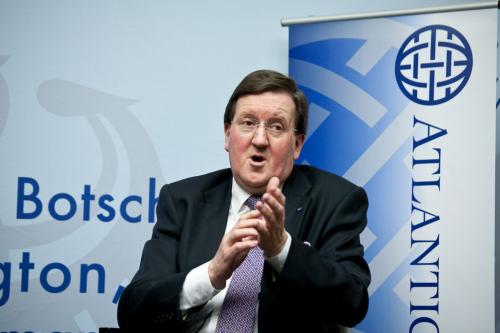
Former NATO Secretary General Lord Robertson, a member of the Atlantic Council International Advisory Board, says that not only were Bob Gates’ parting shots at NATO correct but “he may well have pulled some punches.”
Speaking at London’s Chatham House, he declared that “Bob Gates’ words should put a shiver down the collective European spine.” At the same time, however, the twin wakeup calls of that speech and the US decision to force the European Allies to take a leading role in Libya constituted “a great favor to our continent.”
Indeed, despite sharing Gates’ trepidation about what the Alliance is now, Robertson is optimistic about its future “because the European members of NATO have suddenly been made aware more than ever before that their Emperor is stark naked. Finally the US has said, and done, what it threatened for many years – and that is to demand that Europe protects its own interests through its own means.”
Given that “the developed world has much to lose from the perils of terrorism, organised crime, cyber warfare, failed states, nuclear proliferation, pandemics, population movements – as well as from the backwash from looming resource conflicts – energy, water and food,” Robertson believes the Europeans have no choice but to pick up the burden.
After recounting a lack of vigor in both Afghanistan and Libya, Robertson issued a stark challenge: “I ask my fellow Europeans this, have we no pride? Why are we content to flex economic muscle (the Eurozone crises notwithstanding) but remain so feeble and incompetent when it comes to hard power?”
Later, he admitted, “I am having genuine doubts about the capacity of the main players to achieve victory rather than declaring it. If you want to win, and I passionately believe that we have to win, then you have to look as if you want to win.”
For example, “In the case of Libya, why are we not already planning for the stabilisation force which will be required if Colonel Gaddafi’s mercenary force capitulates?”
He contrasted this with an earlier NATO mission: “In the latter stages of the Kosovo conflict it was the reinforcement of the ‘peacekeepers’ in Macedonia by Gurkhas and Paras which made the Serb Generals believe their game was coming to an end. We had looked them in the eye, physically through CNN as well as metaphorically, and told them that we would go on until we had achieved our aims – Serbs out, NATO in, refugees home. For the whole 78 days of the conflict we held press conferences with variations on that simple message and it eventually got through to the military high command – and Milosovic himself – in Belgrade. But where is that sense of purpose in the wars of today?”
And, he rightly noted, the problem is not with “NATO” but with its member nations: “If NATO nations take on Afghanistan unanimously and take on Libya unanimously and then surround operations with caveats, limitations and no-shows then that is the failure of those national governments, not of NATO.”
While Gates and Robertson both correctly identify the problem and the solution, I see no reason for optimism that it will be enacted upon. Alliance nations outlined a bold new Strategic Concept last November in Lisbon. As I noted at the time (see “NATO’s Lisbon Summit: All the Right Words“) “We simply could not have asked for more. Both the Strategic Concept and the words from all of the NATO leaders were pitch perfect. What remains to be seen is whether they will be followed by deeds.”
In a related post (“NATO: New Strategic Concept, Same Old Alliance“) I pointed out the obvious: “The very countries pledging to do all that are cutting their military capability to the bone and giving every indication that the cuts will be permanent, if not a first step down a slippery slope. How on earth will they make good on these promises, given that sad fact?”
Libya has given us an early glimpse: They can’t.
Not only are even the major European Allies so woefully equipped that they’re running out of bombs and other mundane supplies in a short fight against a fifth rate power but, as one well-placed observed noted in a recent closed door session, they’ve suffered a psychological atrophy, too, seemingly afraid of carrying the ball on their own.
Nor, as much as Robertson would wish otherwise, is there the slightest indication that the European reaction to the wakeup call will be anything other than rolling over and going back to sleep. Which NATO country has decided that, in the face of rioting in the streets over austerity measures, they really need to bolster their defense budgets and make the cuts instead in popular social programs? If it’s happened, I’ve missed the news.
Will the embarrassingly poor showings in Afghanistan and Libya lead the Europeans to buck up their militaries out of pride? The far more likely reaction is a decision to avoid future Afghanistans and Libyas.
James Joyner is managing editor of the Atlantic Council.
